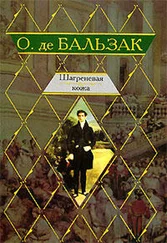| "My Lord--" |
- Сударь... |
| "Go away, go away," cried the invalid. |
- Прочь! Прочь! - крикнул больной. |
| In the hours of the next morning, Raphael climbed the crags, and sat down in a mossy cleft in the rocks, whence he could see the narrow path along which the water for the dwelling was carried. |
На следующее утро Рафаэль, взобравшись на скалу, уселся в поросшей мхом расщелине, откуда была видна тропинка, ведущая от курортного поселка к его жилищу. |
| At the base of the hill he saw Jonathan in conversation with the Auvergnate. |
Внизу он заметил Ионафана, снова беседовавшего с овернкой. |
| Some malicious power interpreted for him all the woman's forebodings, and filled the breeze and the silence with her ominous words. |
Его проницательность, достигшая необычайной силы, коварно подсказала, ему, что означало покачивание головой, жесты безнадежности, весь простодушно-зловещий вид этой женщины, и в тишине ветер донес до него роковые слова. |
| Thrilled with horror, he took refuge among the highest summits of the mountains, and stayed there till the evening; but yet he could not drive away the gloomy presentiments awakened within him in such an unfortunate manner by a cruel solicitude on his account. |
Охваченный ужасом, он укрылся на самых высоких вершинах и пробыл там до вечера, не в силах отогнать мрачные думы, к несчастью для него навеянные ему тем жестоким состраданием, предметом которого он был. |
| The Auvergne peasant herself suddenly appeared before him like a shadow in the dusk; a perverse freak of the poet within him found a vague resemblance between her black and white striped petticoat and the bony frame of a spectre. |
Вдруг овернка сама выросла перед ним, как тень в вечернем мраке; поэтическая игра воображения превратила для него ее черное платье с белыми полосками в нечто похожее на иссохшие ребра призрака. |
| "The damp is falling now, sir," said she. |
- Уже роса выпала, сударь вы мой, - сказала она. |
| "If you stop out there, you will go off just like rotten fruit. |
- Коли останетесь, - беды наживете. |
| You must come in. |
Пора домой. |
| It isn't healthy to breathe the damp, and you have taken nothing since the morning, besides." |
Вредно дышать сыростью, да и не ели вы ничего с самого утра. |
| "Tonnerre de Dieu! old witch," he cried; "let me live after my own fashion, I tell you, or I shall be off altogether. |
- Проклятье! - крикнул он. - Оставьте меня в покое, старая колдунья, иначе я отсюда уеду! |
| It is quite bad enough to dig my grave every morning; you might let it alone in the evenings at least--" |
Довольно того, что вы каждое утро роете мне могилу, - хоть бы уж по вечерам-то не копали... |
| "Your grave, sir! |
- Могилу, сударь? |
| I dig your grave!-and where may your grave be? |
Рыть вам могилу!.. Где же это она, ваша могила? |
| I want to see you as old as father there, and not in your grave by any manner of means. |
Да я вам от души желаю, чтобы вы прожили столько, сколько наш дедушка, а вовсе не могилы! |
| The grave! that comes soon enough for us all; in the grave--" |
Могила! В могилу-то нам никогда не поздно... |
| "That is enough," said Raphael. |
- Довольно! - сказал Рафаэль. |
| "Take my arm, sir." |
- Опирайтесь на мою руку, сударь! |
| "No." |
- Нет! |
| The feeling of pity in others is very difficult for a man to bear, and it is hardest of all when the pity is deserved. |
Жалость - чувство, которое всего труднее выносить от других людей, особенно если действительно подаешь повод к жалости. |
| Hatred is a tonic-it quickens life and stimulates revenge; but pity is death to us-it makes our weakness weaker still. |
Их ненависть - укрепляющее средство, она придает смысл твоей жизни, она вдохновляет на месть, но сострадание к нам убивает нас, оно еще увеличивает нашу слабость. |
| It is as if distress simpered ingratiatingly at us; contempt lurks in the tenderness, or tenderness in an affront. |
Это - вкрадчивое зло, это - презрение под видом нежности или же оскорбительная нежность. |
| In the centenarian Raphael saw triumphant pity, a wondering pity in the child's eyes, an officious pity in the woman, and in her husband a pity that had an interested motive; but no matter how the sentiment declared itself, death was always its import. |
Рафаэль видел к себе у столетнего старика сострадание торжествующее, у ребенка -любопытствующее, у женщины - назойливое, у ее мужа - корыстное, но в какой бы форме ни обнаруживалось это чувство, оно всегда возвещало смерть. |
| A poet makes a poem of everything; it is tragical or joyful, as things happen to strike his imagination; his lofty soul rejects all half-tones; he always prefers vivid and decided colors. |
Поэт из всего создает поэтическое произведение, мрачное или же веселое, в зависимости от того, какой образ поразил его, восторженная его душа отбрасывает полутона и всегда избирает яркие, резко выделяющиеся краски. |
| In Raphael's soul this compassion produced a terrible poem of mourning and melancholy. |
Сострадание окружающих создало в сердце Рафаэля ужасную поэму скорби и печали. |
| When he had wished to live in close contact with nature, he had of course forgotten how freely natural emotions are expressed. |
Пожелав приблизиться к природе, он, вероятно, и не подумал о том, сколь откровенны естественные чувства. |
| He would think himself quite alone under a tree, whilst he struggled with an obstinate coughing fit, a terrible combat from which he never issued victorious without utter exhaustion afterwards; and then he would meet the clear, bright eyes of the little boy, who occupied the post of sentinel, like a savage in a bent of grass; the eyes scrutinized him with a childish wonder, in which there was as much amusement as pleasure, and an indescribable mixture of indifference and interest. |
Когда он сидел где-нибудь под деревом, как ему казалось - в полном одиночестве, и его бил неотвязный кашель, после которого он всегда чувствовал себя разбитым, он вдруг замечал блестящие, живые глаза мальчика, по-дикарски прятавшегося в траве и следившего за ним с тем детским любопытством, в котором сочетается и удовольствие, и насмешка, и какой-то особый интерес, острый, а вместе с тем бесчувственный. |
| The awful Brother, you must die, of the Trappists seemed constantly legible in the eyes of the peasants with whom Raphael was living; he scarcely knew which he dreaded most, their unfettered talk or their silence; their presence became torture. |
Грозные слова монахов-траппистов "Брат, нужно умереть", казалось, были написаны в глазах крестьян, с которыми жил Рафаэль; он не знал, чего больше боялся - наивных ли слов их, или молчания; все в них стесняло его. |
| One morning he saw two men in black prowling about in his neighborhood, who furtively studied him and took observations. They made as though they had come there for a stroll, and asked him a few indifferent questions, to which he returned short answers. |
Однажды утром он увидел, что какие-то двое в черном бродят вокруг него, выслеживают, поглядывают на него украдкой; затем, прикидываясь, что пришли сюда прогуляться, они обратились к нему с банальными вопросами, и он кратко на них ответил. |


![Агата Кристи - На краю [английский и русский параллельные тексты]](/books/32247/agata-kristi-na-krayu-anglijskij-i-russkij-paralle-thumb.webp)
![Агата Кристи - Объявлено убийство [английский и русский параллельные тексты]](/books/33247/agata-kristi-obyavleno-ubijstvo-anglijskij-i-russ-thumb.webp)
![Фрэнсис Фицджеральд - По эту сторону рая [английский и русский параллельные тексты]](/books/34130/frensis-ficdzherald-po-etu-storonu-raya-anglijskij-thumb.webp)
![Роберт Шекли - Компания «Необузданные таланты» [английский и русский параллельные тексты]](/books/34808/robert-shekli-kompaniya-neobuzdannye-talanty-angl-thumb.webp)
![Уильям Макгиверн - Завтра опять неизвестность [английский и русский параллельные тексты]](/books/35168/uilyam-makgivern-zavtra-opyat-neizvestnost-angli-thumb.webp)
![Айрис Мердок - О приятных и праведных [английский и русский параллельные тексты]](/books/35170/ajris-merdok-o-priyatnyh-i-pravednyh-anglijskij-i-thumb.webp)
![Мэри Райнхарт - Альбом [английский и русский параллельные тексты]](/books/35200/meri-rajnhart-albom-anglijskij-i-russkij-paralle-thumb.webp)
